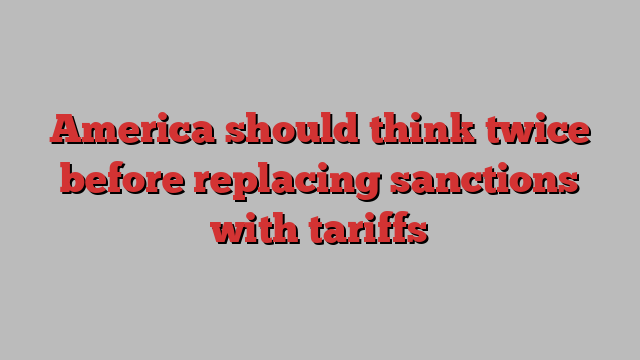
Unlock the US Election Countdown newsletter for free
The stories that matter on money and politics in the race for the White House
The writer is a professor at Johns Hopkins University and co-author of ‘Underground Empire: How America Weaponized the World Economy’ with Abraham Newman, who also contributed
Donald Trump likes to say that he alone can protect America from being “ripped off” by greedy allies. So why does he want to replace the one cornerstone of national security that foreigners subsidise, with a system that would make American consumers pay the costs?
In recent weeks, Trump has talked about moving away from US financial sanctions against Russia and China, which he claims are undermining the dollar and making China’s currency more attractive. Instead Trump wants to turn tariffs into America’s go-to tool for coercion. The threat of 100 per cent tariffs might force reluctant governments to stick with the dollar, or coerce skinflint Nato members into spending more on their military.
America does have an unhealthy relationship with financial sanctions. But it got hooked on them because it doesn’t have to pay most of their costs. It makes foreigners pay instead. Trump wants to give this up, replacing US sanctions power with a costly knock-off of Chinese economic coercion.
It is unlikely that the former president is interested in the long-term risks of sanctions overuse. He probably wants to relieve pressure on Russia and cryptocurrency (which is increasingly clashing with the US security state). But even if he’s insincere, he’s not completely wrong.
Dollar power allows the US to press foreign banks and financial actors into service, forcing them to cut off adversaries’ access to the global financial system. That is why America’s financial sanctions are so powerful. But as officials like former Treasury secretary Jacob Lew have argued, the more that the US exploits the dollar, the more that other countries will look for ways around it.
Still, the dollar, if used carefully, allows America to conduct coercion on the cheap. China isn’t nearly so lucky. It has to pay to punish others. The Chinese government doesn’t control global finance, and has instead weaponised access to China’s markets to inflict economic pain on other countries.
Cutting off market access hurts China as well as its targets, undermining its trade and weakening its prosperity. Chinese businesses and consumers lose their access to foreign goods, or have to pay more for them. For example, when China wanted to punish Australia, it manipulated regulations to stop imports of Australian coal. That didn’t work very well. Limiting market access reportedly cost China $2bn a week while encouraging Australia to find lucrative markets elsewhere.
That is the approach that Trump wants to copy, using huge tariffs to cut off market access, instead of regulations. To borrow the language of his opponent, Kamala Harris, Trump wants to replace America’s economic key security weapon with a vastly inefficient “sales tax” on American consumers and businesses. Instead of taking advantage of China’s vulnerabilities, he wants to emulate them.
This would happen at enormous scale: Trump promises “bigger tariffs than you’ve ever seen in this country before”. And as JD Vance suggests, it is likely to be used to punish allies as well as, or perhaps even instead of, adversaries.
Of course, the more that the US uses tariffs to punish allies, the more they will look for markets elsewhere. The German economy is already deeply entangled with China’s. It will become more so if Trump wins and gets his way. The careful efforts of the Biden administration to build long-term co-operative arrangements with allies over semiconductor export and manufacture will be ripped into shreds.
It’s true that the US has become addicted to financial sanctions. But punitive tariffs are a much harder drug, with harsher immediate side-effects and a worse long-term prognosis.